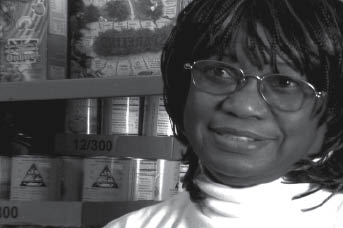Rosa Gibson

In the summertime, a garden grows in a vacant lot on Wohlers Avenue, across the street from Rosa Gibson and the Community Action Information Center. It’s been growing for seven years, tended by Gibson and a cadre of volunteers from the neighborhood, as well as by young men and women in trouble with the law, who are sent to Gibson by the courts. In addition to beauty and social therapy, the gardens provide fresh vegetables in the summer, which Gibson distributes to people in need throughout the neighborhood, supplementing the bags of donated groceries she collects for distribution from the Food Bank of Western New York.
But it’s February, and Rosa’s Garden of Love is closed for the winter. (Though she is spending the fallow months working with some design students from UB on a new “shoe garden,” in which discarded shoes are used as planters. This year’s model will comprise shoes donated by local celebrities.) Right now her focus is on getting groceries to the elederly, to shut-ins and to those down on their luck. Gibson is out in the neighborhood every day, reaching out to those in need, encouraging pride in the community and—when she feels it’s justified—delivering a sharp word to those who can but won’t help themselves and their neighbors. (That number includes not a few local politicians and community leaders.) Recently Artvoice spent a few days with Gibson, helped her to make some deliveries and asked her a few questions about her organization and her activism.
Artvoice: Where does the food you’re distributing come from?
Rosa Gibson: The Community Action Information Center receives food from the Food Bank of Western New York. Eighty percent of our food comes from the Food Bank. The truck that we just unloaded is called the express truck, and the express truck comes once a month. The express truck is really helpful because we make deliveries to the sick and the shut-ins in the area. We don’t just accept walk-ins, we make home deliveries.
AV: Of all the things the CAIC does in your neighborhood, what makes you most proud?
RG: Truthfully, when I make home deliveries and a senior gives me that bear hug and says to me, “This came just in time,” or if I have something sweet, “How did you know I wanted something sweet,” and before I come back to the center there’s phone calls: “Thank you, thank you.” This way I know I have helped someone.
I must say, not everyone calls to say thank you, because some of them think that this is something that I owe them, that I must do. But there are some that are grateful.
AV: In the summer, your garden makes this block beautiful. Is it having an impact on the neighborhood?
RG: When we first moved in here, seven or eight years ago, this was like a junkyard. You could call it Junkyard Drug Alley. The gardens that we have now had some of everything in it: boats, propane tanks, overgrown weeds. Thanks to the Mayor’s Impact Team—that’s the group that really came in and gave us a hand when we first got started. And what they said to us when they cleaned it out, “We hope you keep it up.” And since that time it has been kept up. We are proud and the community itself is proud of it.
AV: That was under Mayor’s Masiello’s administration. How’s it been working with Byron Brown?
RG: He’s only been there for a year and there has not been much contact with him. The contact is not as great, truthfully, as I would like for it to be. I’d like for the little nobodies in the community to be able to talk to the mayor. I would like for the little nobodies in the community to be able to go to City Hall and say, “Guess what, I went in the mayor’s office and I talked to the mayor.” We can’t do that…I have to say, why? I’m still asking myself why. I’m going to ask myself why for a little longer, and after that I have to be a mover and a shaker and make things happen.
AV: It seems like you never stop working. How do you keep it up?
RG: There’s a lot of mornings I don’t feel like getting out of bed. But I say to myself, “If I don’t, who will?”…I have to encourage myself: “Get out of that bed. There’s someone out there who needs you.”
To learn more about the Community Acton Information Center, or to donate time or money (or closed-toe shoes), call 885-5925.
|
Issue Navigation> Issue Index > v6n8: The Faces of Deaccession (2/22/07) > Rosa Gibson This Week's Issue • Artvoice Daily • Artvoice TV • Events Calendar • Classifieds |









 Current Issue
Current Issue